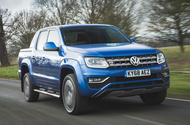First stage of ‘global alliance’ will see German and American manufacturers collaboration on mid-size pick-up truck
Ford and Volkswagen have signed a contract to co-develop a replacement for the Amarok pick-up truck.
Ford’s mid-size Ranger pick-up truck will likely form the basis of any future platform, and may help Volkswagen reduce the costs associated with designing a replacement for the Amarok. The partnership could see a production model on sale by 2022.
The agreement, as reported by Automotive News Europe, is the first to follow the German and American brands’ announcement of a ‘global alliance’, which could eventually expand to include electric and autonomous cars.
The agreement is likely to involve Volkswagen developing a van based on Ford’s Transit platform, and the two have also signed a memorandum of understanding to “investigate collaboration” on electric and autonomous vehicles and mobility services. Both companies have said they’re open to considering “additional vehicle programmes” in the future.
Ford boss Jim Hackett said the alliance will “help both companies create value and meet the needs of our customers and society” and “give us the opportunity to collaborate on shaping the next era of mobility”.
Volkswagen boss Herbert Diess added that the alliance “will be a cornerstone for our drive to improve competitiveness”.
The alliance will be governed by a joint committee headed by Hackett and Diess and does not involve any cross-ownership between the two firms.
The news follows an announcement in June that the companies were looking to collaborate on the development of future commercial vehicles, among other projects. Ford’s president of global markets, Jim Farley, called this move an example of Ford’s commitment to “leveraging adaptive business models”.
Both Volkswagen and Ford are keen to introduce new electric vehicles to the European market, where strict regulations are being imposed on the development and sale of petrol and diesel vehicles. Volkswagen has previously stated its intention to produce 2-3 million electric cars by 2025.
Ford and Volkswagen, alongside BMW and Daimler, are co-owners of the Ionity scheme, which is developing a network of ultra-fast charging stations across Europe.
The alliance is not the first of its kind; last year, Honda invested $2.75 billion in General Motors’ self-driving division. The Japanese and American companies plan to challenge tech giants Apple and Google with a new range of driverless taxis.
Established car makers around the world are beginning to shift their focus entirely to researching and developing zero-emissions and self-driving vehicles as global legislation aims to reduce pollution.
Read more
Ford and Volkswagen Group announce plans for strategic alliance
Volkswagen’s MEB electric car platform: full details revealed
Source: Autocar
